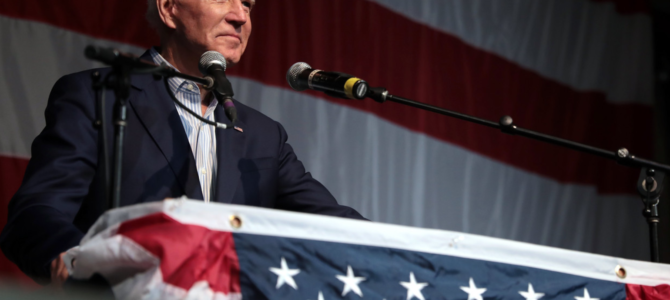
Should the federal government fund child care for working parents at the expense of families who provide the primary care for their children? Every Democratic candidate for president thinks so.
The discussion at this last debate was markedly different than when Sen. Kirsten Gillibrand was still present, however. Last July, Gillibrand criticized Joe Biden’s past opposition to a child care tax credit, citing a 1981 op-ed he authored as the sole Senate vote opposing an expansion of the credit, which extended even to high-income earners. The headline most ruffled Gillibrand’s feathers: “Congress Is Subsidizing Deterioration Of Family.”
Gillibrand accused Biden of opposing working women, so of course his stance on subsidized child care has fully evolved, despite her mischaracterization of his argument. It’s a shame, though, because his opposition to funding child care for parents who don’t have the financial need for two incomes was principled, and his defense was insightful.
It’s worth revisiting Biden’s arguments for fairness in our fiscal policy and for caution in the underlying social policy. Both still apply to the debate today.
Government Shouldn’t Favor Day Care over Parent Care
Our democratic culture is rabidly relativistic about valuations of many things: art, beauty, dress, physical appearance, personal identity, lifestyle choice — and whether a mother works or stays home, breastfeeds or uses formula, delivers naturally or opts for the epidural. The realm of childrearing is no exception to this cultural discourse — despite, unfortunately, the ironically bipolar form of dogmatism that mothers today still endure about ther choices they might make. Ever try to order a glass of wine or a grande latte while eight-months pregnant? Save yourself the insufferable lectures from strangers.
In most of these areas, liberalized societies desperately need to regain a shared understanding of truth. That said, thanks to modern innovations ranging from streamlined freelancing opportunities to online marketplaces, there are dozens of ways for families to organize how they earn income, parent, and engage in other forms of caretaking. Likewise, there are as many ways to be a good mother as there are mothers.
So why should the heavy hand of government tip the scales in favor of day care? Biden made this case in 1981 as a simple matter of fairness, stating, “I do not believe it fair to ask a family of marginal income, choosing to provide the primary care for their children, to subsidize an upper income family’s day care.”
As a mother who chooses to stay home, snatching chunks of time to work whenever they come to me during the day, I consider myself extremely blessed. At the same time, I fully share Biden’s sentiment, and I can only imagine how much stronger a family of more modest means who chooses to provide the primary care for their children might share it.
Families can organize their own affairs, whether that’s having a full-time stay-at-home mom or dad, a work-from-home mom, or both parents working outside the home. Studies have shown most women actually want to be home with their children, so why would we penalize this choice in favor of someone else’s?
Biden Is Adopting Policies He Once Condemned
Biden also made a radically unpopular argument that was apparently unpopular even in 1981: Families have the responsibility to care for their own, but our society largely neglects these bonds in favor of pursuing more things.
“The day-care centers and nursing homes blossoming across the American landscape are monuments to our growing unwillingness to accept personal responsibility for those to whom we own the most — our children, our parents and our grandparents,” Biden wrote. “I do not believe that the federal government should be a party to a system which encourages couples to place their children in day-care centers in order to acquire material possessions that go far beyond any family basic necessities.”
Biden made a strong case to see child care tax credits as a social policy that shapes society’s choices and values. When modern families are fortunate enough to have the basic material comfort needed to raise children through one parent’s income, they then have to make a choice about how to provide care for their children. This is and should be a personal choice families make.
But Biden recognized that America had fallen victim to a pervasive materialism and that those in power too often prey upon this impulse through a form of amoral capitalism that holds GDP above all else, even at the sake of the natural bonds and duties of family.
Biden refused to endorse a policy that would incentivize the distortions of materialism while eroding our most basic social fabric. He saw his colleagues using tax credits to nudge mothers who might otherwise stay home with their children back into the market — to keep earning, so they could keep buying, so the cogs could keep turning, so the machine could keep rolling. All masked, of course, in the cry of women’s liberation.
Sadly, that was the Biden of the ’80s. Biden 2020 sounds like a caricature of what he once decried. When announcing his $8,000 tax credit for anyone to use toward child care, Biden told the crowd, “It would put 720 million women back in the workforce. It would increase the GDP — to sound like a wonk here — by about eight-tenths of 1 percent. It would grow the economy.” Biden has officially succumbed to woke capitalism.
Good Policy Doesn’t Hurt Families
All of that said, this doesn’t mean the government should do nothing. Instead of having an $8,000 tax credit that gives a boost only to families using day care, why not structure the assistance so parents can best decide how to spend the money — a solution that truly liberates a woman’s choice?
One practical solution would be allowing all women to spend more time with their babies and children, rather than encouraging the opposite. There is a political appetite for a paid family leave proposal that wouldn’t raise taxes, increase the debt, or adversely affect women’s wages or employment. The only proposal that fits this bill is the Cassidy-Sinema plan, a budget-neutral, bipartisan plan to allow parents to pay for their own leave.
Under the new Tax Cuts and Jobs Act, parents receive up to a $2,000 child tax credit (CTC) for each child. The Cassidy-Sinema plan would allow parents to front-load this credit to receive up to $5,000 upon the birth or adoption of a child. The CTC would then be adjusted to $1,500 annually for the next 10 years. For families facing that sudden increase in costs with the arrival of a baby, or who don’t have employer-provided paid leave, this money would be a welcome relief, affording mothers and fathers that necessary period of bonding with their baby.
According to a Pew study, in 2016, 50 percent of Americans who took family leave had to use savings set aside for another purpose to cover their lost wages due to child care expenses; 37 percent took on debt, and 41 percent had to cut their leave time short.
Parents could also choose to use the front-loaded tax credit in other ways that might benefit their family more, especially if their employers already provide leave. Note that parents are doing the choosing, not the government. Families often encounter unexpected costs associated with childbirth, infant care, maternal care, and, should they choose to go back to work, child care. The Cassidy-Sinema plan would provide a no-strings-attached boost that would help working parents and stay-at-home moms all the same.
Since it seems the Democrats have formed a party line on this issue, it’s up to Republicans to develop creative solutions that treat all families fairly. It’s comic, but this time, Republicans’ guiding light won’t be Thomas Jefferson or Ronald Reagan. It will be Joe Biden.









